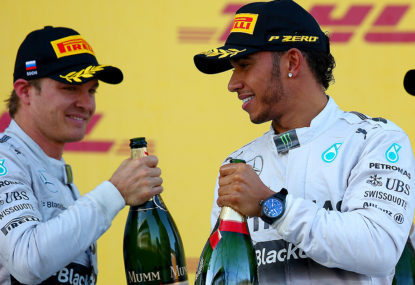The IndyCar Afterburn: The pitfalls and pinnacles of Long Beach 2024
The Long Beach Grand Prix is the Monaco of American motorsport, and this past weekend, the IndyCar Series reminded everyone exactly why. We witnessed…

It was a beautifully judged but poorly timed victory for Nico Rosberg when he crossed the Brazilian finishing line 7.7 seconds ahead of teammate Lewis Hamilton.
Rosberg’s second consecutive win off the back of his fifth-straight pole position is the latest sign of Rosberg’s end-of-season resurgence.
He is recapturing the 2014 form that took the title fight to the final round, albeit it is far too late to secure him anything but runner-up in the 2015 drivers championship.
But even in the straightforward there can be controversy, with Lewis Hamilton’s fortnight-long suggestion that Mercedes has been showing Rosberg undue “warmth” to counterbalance his despondency after losing the title finally coming to a head.
Mercedes refused to put its star driver on an alternative strategy to help him ease past the German in the Brazilian Grand Prix.
For the entire season, spanning back into last season, Mercedes has always played it safe when it comes to strategy. They prioritise clean one-two finishes and, in doing so, the lead driver of the day, to achieve its goal – but with both titles sewn up Hamilton believed there was no need to keep the status quo.
“I’m here to race,” he declared on the podium. “When you both have to [pit] pretty much the same order it’s kind of already set from the beginning.
“For sure I’m like, ‘If there are any other strategies, let’s do it, let’s take a risk, let’s do whatever’ … I think that’s what people want to see.”
Unspoken by Hamilton, however, is the second reason for Mercedes’s conservatism: it would be only a matter of time until the strategy applied to one driver disproportionately disadvantaged him over the other, potentially upsetting the team’s precarious internal harmony.
Even if the team and drivers accepted this risk, opening strategy choice would involve dividing the garage into two teams, which Mercedes has worked tirelessly to avoid. But worse still it opens both sides of the garage to take their eyes of the ultimate prize as they sought to inflict maximum damage on their most immediate opponent.
The team’s position on the matter solidified over 12 months, bookended by the 2014 and 2015 Hungarian grands prix.
Last year the two-stopping Hamilton’s refusal to allow his three-stopping teammate past resulted in Rosberg missing an opportunity to challenge Daniel Ricciardo for victory.
This year, with both cars forced into the midfield after messy opening laps, the two drivers were forced to adopt different strategies leading to Rosberg choosing to cover Hamilton at his final pit stop rather than gamble for the win – the result was a crash for Rosberg and a victory for Ferrari’s Sebastian Vettel.
Add to the mixture Mercedes’s own-goal in Monaco where it tried to appease Hamilton’s misinformed desire to make an extra tyre stop, and it become obvious why Mercedes is averse to pitting strategist against strategist.
The potential to set precedents notwithstanding, Hamilton called for strategy freedom because the team had nothing to lose, so had no reason not to allow its drivers to put on a show. Should it have allowed him an alternative strategy on this basis?
On two levels Hamilton’s claims fall down. On one he disregards the fact that Rosberg seemed capable of executing a two-stop strategy, albeit a marginal one, and that both cars converted to three-stop strategies because Hamilton tried unsuccessfully to pass Rosberg during the second stint, destroying his tyres as a result. In fairness an alternative strategic opportunity should never have presented itself to him.
On a second level, Hamilton’s claim to wanting to put on a show for the fans is disingenuous.
An alternative strategy, if it had proved faster, would likely have had him pass Rosberg during the third pit stops, which is hardly the sort of on-track action Hamilton said he was appealing for.
Rather than try to bargain with his team to provide him with an unfair advantage, Hamilton should instead take the advice he freely issued to Rosberg when their positions were reversed at this year’s Chinese Grand Prix: make the pass.
“It’s not my job to look after Nico’s race,” he said, responding to Rosberg’s claims he had driven deliberately slowly to back him into the pursuing Ferraris knowing his identical Mercedes car couldn’t make a pass for the lead.
“If Nico wanted to get by, he could have tried. But he didn’t.”
What must really sting for Rosberg is that he was lambasted after the Chinese Grand Prix for, admittedly unedifyingly, accepting the agreed intra-team status quo rather than demand his team give him a leg-up.
Maybe it was hard for the newly crowned world champion to admit it, but without what would have been a gross intervention of his team to give him a strategic advantage over the serene Rosberg in the lead, Hamilton simply did not have the measure of his teammate in Brazil.
Perhaps he can try again in Abu Dhabi.
Follow @MichaelLamonato on Twitter.